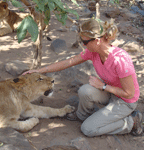Story by Chris Graham

Which is precisely where second-year Virginia Tech graduate veterinary student Becky Davis found herself one day in Africa recently.
“He was darted, but if he’d wanted to get up, he could’ve gotten up. The person in charge of game reserve said, If he tries to get up, you have to lay on him, whatever, you can’t let him get up. You’re in charge. That was a little scary. You definitely didn’t want him to get up,” said Davis, who joined a group of 12 veterinary students on a three-week trip to South Africa in June learning how to treat wildebeests, buffaloes and big cats including lions and tigers.
“These are animals that we just don’t have in the States, and if we have it, it’s at a zoo, so it’s already enclosed. It was very different treating them in the conditions at the game reserve,” said Davis, of Waynesboro, who spent the bulk of the trip in the game reserve at Kruger National Park that runs along the Mozambique border.
There was the buffalo whose horn had broken all the way to the eye socket. “I could stick my whole hand in the horn,” said Davis, who cleaned out the damaged horn and treated it with antiseptic so it wouldn’t get reinfected.
Another case involved a buffalo that had attacked a farmer. “It turned out that the buffalo had just had a calf, and the farmer had just happened to be working near the calf. The buffalo attacked the farmer and threw him up into a tree with a cut on his head and a dislocated shoulder,” said Davis, who helped subdue the buffalo with her newfound skills in darting.
The group learned how to use a dart gun on wild animals on the move from a helicopter by aiming at a target on the back of a moving truck.
“We got up in the helicopter and started going, and then the truck took off. We went sideways, and then we had to have the gun out the door, there was no door out there, so it was a little scary, and the gun was moving, the wind was blowing, and we had to aim for the target on the back of the truck. Yeah, that was hard,” said Davis, who didn’t hit the target herself, but was at least “inside the truck” on her shots.
“Only a couple of people actually hit the target. Some people missed the truck entirely. But it was windy that day. Very windy,” Davis said.
Davis “definitely” wants to go back to Africa, and plans to return next summer for more training in wild-animal medicine.
“It’s not as structured as small-animal medicine,” Davis said. “There aren’t as many drugs for wild animals. There’s not that much research into it yet. It’s still a developing field, and it’s exciting being on the front lines of a new medical field.”










